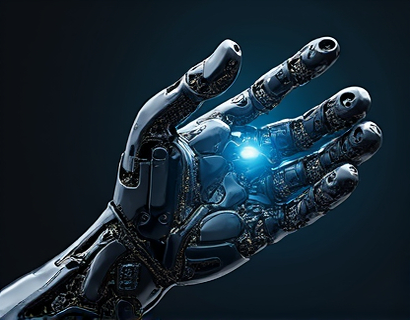Unlocking Digital Transformation: Leveraging Crypto and AI for Enhanced Ucosystem Experiences
The digital landscape is undergoing a profound transformation, driven by the convergence of blockchain technology and artificial intelligence (AI). This synergy is redefining how applications and services operate, offering unprecedented levels of connectivity, security, and personalization. For tech-savvy innovators and early adopters, understanding and harnessing the potential of these technologies is crucial for staying ahead in the digital realm. This article explores the transformative power of blockchain and AI, providing a roadmap for enhanced digital experiences and growth.
The Intersection of Blockchain and AI
Blockchain and AI are two of the most revolutionary technologies of our time, each with its own set of capabilities and limitations. When combined, they create a powerful synergy that can address complex challenges and unlock new opportunities. Blockchain provides a decentralized, transparent, and secure framework for data management and transactions, while AI brings intelligence, automation, and predictive capabilities to the table. Together, they can enhance trust, efficiency, and user experiences in various digital ecosystems.
Enhanced Security and Trust
One of the primary benefits of integrating blockchain with AI is the significant improvement in security and trust. Blockchain's immutable ledger ensures that data once recorded cannot be altered without consensus from the network, reducing the risk of fraud and data tampering. AI can further bolster security by detecting and mitigating threats in real-time, analyzing patterns and anomalies to prevent breaches. This dual-layer approach creates a robust defense mechanism, making digital interactions safer and more reliable.
Improved Data Management and Privacy
Data management and privacy are critical concerns in the digital age. Blockchain technology offers a decentralized approach to data storage, allowing users to maintain control over their personal information. AI enhances this by enabling sophisticated data management systems that can anonymize and encrypt data, ensuring compliance with privacy regulations such as GDPR. Smart contracts on the blockchain can automate data sharing and access, providing a transparent and auditable trail. This combination empowers users with greater control and confidence in how their data is used and protected.
Personalized User Experiences
Personalization is a key driver of user engagement and satisfaction. AI algorithms can analyze vast amounts of user data to create tailored experiences, recommendations, and interactions. When integrated with blockchain, these experiences become even more secure and trustworthy. For instance, AI-driven recommendation engines can suggest content or products based on a user's preferences and behavior, while blockchain ensures that the data used for these recommendations is authentic and not manipulated. This results in a more accurate and reliable personalization process, enhancing the overall user experience.
Decentralized Identity Management
Decentralized identity management is another area where blockchain and AI can make a significant impact. Traditional identity verification processes are often centralized, vulnerable to hacks, and prone to misuse. By leveraging blockchain, users can create and manage their digital identities in a decentralized manner, with AI assisting in verifying and authenticating these identities. This not only enhances security but also provides users with more control over their personal information. The combination of self-sovereign identity and AI-driven verification creates a seamless and secure user authentication process.
Optimized Operations and Efficiency
Businesses and organizations can benefit greatly from the integration of blockchain and AI in their operations. Automation and efficiency are key outcomes of this synergy. AI can streamline processes by automating repetitive tasks, reducing human error, and increasing productivity. Blockchain can facilitate transparent and secure transactions, eliminating the need for intermediaries and reducing costs. Smart contracts on the blockchain can automate complex workflows, ensuring that all parties adhere to agreed-upon terms and conditions. This combination leads to more efficient and cost-effective operations, allowing businesses to focus on innovation and growth.
Supply Chain Transparency and Traceability
Supply chain management is a complex and often opaque process, but blockchain and AI can bring much-needed transparency and traceability. Blockchain can create an immutable record of every step in the supply chain, from production to delivery, ensuring that all parties have access to real-time, verifiable information. AI can analyze this data to optimize logistics, predict delays, and identify bottlenecks. This synergy not only enhances efficiency but also builds trust among stakeholders, as every transaction and movement is recorded and verified. Consumers can benefit from greater transparency, knowing the origin and journey of the products they purchase.
Innovative Business Models
The convergence of blockchain and AI opens up new possibilities for business models that were previously unimaginable. Tokenization, for example, allows for the creation of digital tokens that represent assets, rights, or utilities. When combined with AI, these tokens can be used to create dynamic and adaptive business models. For instance, AI can analyze market trends and user behavior to adjust token prices or distribution mechanisms in real-time. This flexibility and responsiveness can lead to more resilient and customer-centric business models, fostering innovation and growth.
Decentralized Finance (DeFi)
Decentralized Finance (DeFi) is a prime example of how blockchain and AI can revolutionize traditional financial systems. DeFi platforms use smart contracts and blockchain to provide financial services such as lending, borrowing, and trading without intermediaries. AI can enhance DeFi by offering predictive analytics, risk assessment, and automated trading strategies. This combination can democratize access to financial services, reduce costs, and increase efficiency. Users can benefit from greater financial inclusion and control over their assets, while businesses can tap into new markets and opportunities.
Challenges and Considerations
While the potential of blockchain and AI is vast, there are several challenges and considerations that must be addressed to fully realize their benefits. Scalability, regulatory compliance, and user adoption are key factors that need attention.
Scalability
One of the main challenges for blockchain technology is scalability. As the number of transactions increases, blockchain networks can become slow and expensive to use. However, advancements in blockchain architecture, such as layer 2 solutions and sharding, are addressing these issues. AI can also play a role in optimizing blockchain performance by predicting and managing network load, ensuring smooth and efficient operations.
Regulatory Compliance
The regulatory landscape for blockchain and AI is still evolving, and compliance is a critical consideration for businesses and developers. Ensuring that applications and services adhere to local and international regulations is essential to avoid legal issues and build trust. Collaboration between regulators, technologists, and industry stakeholders is necessary to create a clear and supportive framework that fosters innovation while protecting users and the public interest.
User Adoption
Widespread adoption of blockchain and AI technologies depends on user understanding and acceptance. Education and awareness campaigns can help demystify these technologies and highlight their benefits. User-friendly interfaces and intuitive applications can also encourage more people to embrace these innovations. By focusing on the user experience and providing clear value propositions, the digital ecosystem can grow more rapidly and inclusively.
The Future of Digital Interactions
The integration of blockchain and AI is not just a trend but a fundamental shift in how digital interactions are designed and experienced. As these technologies continue to evolve, we can expect even more innovative applications and services that enhance connectivity, security, and personalization. For tech-savvy innovators and early adopters, embracing this synergy is essential for staying competitive and relevant in the digital age.
In conclusion, the convergence of blockchain and AI offers a powerful roadmap for digital transformation. By leveraging these technologies, businesses and individuals can unlock new possibilities, create more secure and efficient systems, and deliver exceptional user experiences. The future is bright for those who are willing to explore and harness the potential of this transformative combination.










































